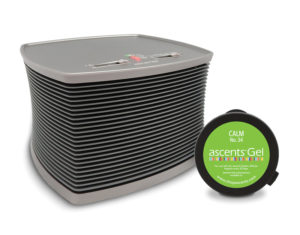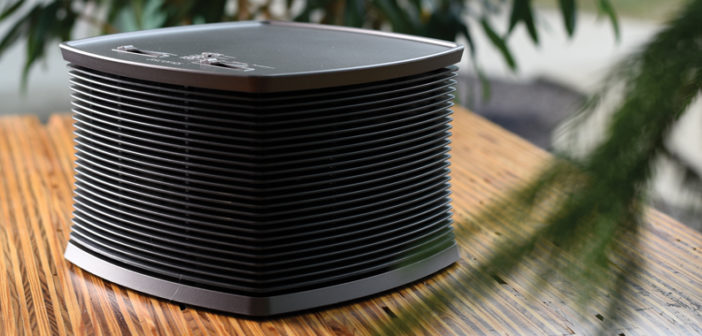CLEVELAND—Non-pharmaceutical remedies provide a natural alternative for common ailments. While these products may be gaining traction, they’re rarely found in a hotel guestroom—which could be just the place that needs these products the most.
Aeroscena, a Cleveland-based clinical aromatherapy company, provides these alternatives that help with pain, sleep, stress and nausea, and which even curb late-night cravings, all common when on the road. In addition, the aromas can also create signature scents for hotels, a powerful branding device.
The company provides hotel partners with its Ascents Diffuser systems, an ambient diffuser combined with a patented solid essential oil gel, which was designed to be 100% pure and natural.
“As word got out about the success we were having in healthcare settings, the hospitality industry took note,” said Mark Kohoot, CEO, Aeroscena.
Beginning in the healthcare sector, it was Delos that introduced Aeroscena into the hospitality space, featuring its products in its health-focused Stay Well rooms. These spaces aim to infuse wellness into guestrooms through fresh air and personalized lighting, among other health-related features.
According to Kohoot, the diffuser employs cold diffusion technology, which doesn’t alter delicate, therapeutic compounds and delivers a dry and sanitary diffusion. The gel is a solid, natural essential oil, designed to perform like a liquid rather than a messy oil.
“They are easy for housekeeping to replenish, making them a great choice for hotels looking to differentiate their rooms or suites with scent,” he said.
“Our mission is to improve well-being with natural scents,” Kohoot added. “With our experience in healthcare, the transition to hospitality was easy because our products’ features also make sense for them. Housekeeping performs a simple, monthly cartridge change, avoiding the issues of water-based, refillable aromatherapy diffusers, which not only includes spillage but also the issue of mildews, mold and germs.”
Aeroscena is also exploring ways of diffusing these oils to a larger space via HVAC systems. “This would allow hoteliers to meet the expectations of wellness guests who can immediately tell the difference between the artificial ‘signature’ scents typically used in hotel lobbies from beautiful, natural fragrances,” Kohoot noted.
Scents are a useful force in affecting people’s perceptions of their environment, whether they notice it or not.
“It is the first sense that really hits us, and scent is proven to influence purchasing and browsing behaviors and, crucially, impacts whether or not someone wants to return,” Kohoot said.

The Calm No. 34 Ascents Gel, when used in concert with the Ascents Diffuser, was scientifically formulated from a blend of pure essential oils to address symptoms of stress and anxiety.
Scents can elicit memory, make a person feel at home, calm and relax them, but they can also make guests feel unhealthy or unclean, which, of course, contributes to their level of well-being.
“These effects are all possible when hoteliers make an effort to place the right natural, functional fragrance in the right areas of a hotel,” he said. “Who wouldn’t want people to feel more productive in their meeting rooms and be more likely to book events there again? Be better able to sleep in their rooms? More energized in the gym area? Calmer in the lobby? Scent has the power to do all of these things and more.”
But how do these aromas work—and, even more importantly, do they work? According to Kohoot, there has been anecdotal “evidence” about what works and what doesn’t, but it’s the scientific evidence and medical research that’s changing things.
“We’re fortunate to partner with hospitals and other healthcare professionals to increase the research that is carried out in clinical environments,” he said. “So, it’s not so much that aromatherapy is important, but that clinical aromatherapy is important—defined as single oils and blended formulas that are clinically based, backed and tested for efficacy, as you would any reputable over-the-counter wellness product.”
There really isn’t much room for skepticism in hotels, anyway, Kohoot said, as the guestrooms are prepared with these scents prior to guests’ arrival.
“The room is already infused with scent upon their arrival, and the controls on the machine are very intuitive, giving guests complete power over how strong or weak the scent is, or the timing on which it runs. They even have the choice to turn it off, though, judging by feedback, that isn’t happening very often,” he said.
Aeroscena also provides scent consulting services, working with hotel clients to deliver unique aromas.
“One example of this is ‘Fresh,’ a scent we created specifically for the hospitality industry. This is our first ‘nonfunctional’ fragrance and was designed with client participation to include ingredients that have inherent functionality and are designed to uplift, relax and balance guests. We can also work with hospitality brands to create custom scents for their properties. These can not only be diffused in hotel spaces, but can also be provided as ‘takeaway’ personal inhalers so the memory of their stay can come flooding back to them whenever they smell it,” Kohoot said.
The CEO hopes to see these properties offer these personal inhalers as part of an amenities menu, similar to pillow menus in guestrooms. With the need to personalize on the rise, he predicts that scent will just become one more amenity option.
“Hotels like our products because they can offer them in several different ways: One is as an upgraded amenity that gives them a higher return on the room on a nightly basis; our personal inhalers also make an excellent in-room welcome gift at no charge, or for a cost,” he said. “Guests want choice and the ability to customize their experience. We believe we will be seeing more and more of this in hotels at every price point, and ambient scenting—especially functional scent—will simply become one more option guests can choose to control.” HB

